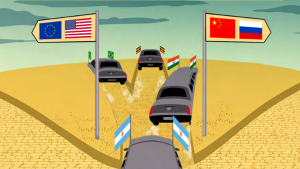In this project, we have analysed the foreign policy positioning of India, Kenya, Colombia and Turkey – four very different countries that see themselves as key players in their respective regions. The following insight has been generated for the (foreign) policy of Germany and the European Union in their relations with these and other countries with which an intensification and expansion of strategic partnerships are desired:
1. Germany and the EU must move away from “two-camp thinking” and develop a greater tolerance of ambiguity. Germany and the EU must move away from “two-camp thinking” and develop a greater tolerance of ambiguity.
- The “West” as a political category is not very helpful if the goal is to attain a deeper understanding of the seismic shifts taking place at a global level. The “division of the world into two camps” implicit in this view does not do justice to the complexity of the world today and is moreover normatively overloaded and exclusive.
- Germany and the EU need to develop a greater tolerance of ambiguity while prioritising the overarching importance of a partnership even when there are certain differences. Ambiguities should be tolerated and preconceived positions should be avoided, especially when they seek to secure the moral high ground. Above all, Germany and the EU would be well-advised to avoid forcing partner countries to “take sides”.
- Germany and the EU must be prepared for (potential) partners positioning themselves in a pragmatic and challenging manner. Perceived inconsistencies on issues involving the international order are often an expression of a foreign, economic and trade policy that is driven by interests, implying that partners can increasingly turn to alternative offers of cooperation if it suits them.
2. Germany and the EU should not neglect “positively inclined” powers.
- Countries included in this study like Kenya and Colombia should not be erroneously stamped as “natural partners”, as this can sow the seeds of creeping neglect and is also perceived as a sign of neglect by them.
- Germany and the EU should instead see these countries as important communication channels and bridge-builders in the so-called Global South, with whom it is moreover possible to openly discuss critical issues. Questioning one’s own positions and also accepting diverging views in any assessment of shifting global parameters are absolute musts here; frequently conflicting signals sent by the EU to partner countries often make it harder to gain traction there.
- Medium-sized countries such as Kenya and Colombia are less in the international limelight and have fewer resources. Germany and the EU have something to offer these countries in a wide range of policy areas with a reasonable amount of resources with good prospects of being profitable for both sides. At a time when Germany’s own resources are increasingly stretched thin, this consideration should not be neglected in Germany’s foreign policy.
3. Germany and the EU should support partner countries’ efforts to bring about a reform of the international system.
- All of the countries included in the analysis are laying understandable claims to greater representation and more say in the international system. In efforts to reform the international system, Germany and the EU can only be perceived as trustworthy partners if they sincerely address these expectations and provide support wherever this aligns with their own interests.
- A reform of the international system will not be possible without substantial concessions on the part of Germany and the EU to the benefit of those countries that have been underrepresented to date. Despite domestic political constraints, Germany and EU need to cast off any and all blinders when it comes to these reform efforts if only to prevent Germany and the EU from losing credibility.
4. Germany needs more strategy and coherence in its foreign policy.
- In-depth knowledge of a particular country’s actual matrix of interests and most urgent needs is indispensable if Germany is to develop and expand its cooperation with a particular country. German diplomatic missions abroad are key parts of the equation in this regard, but have been downsized over the past ten to 15 years in favour of posts in Berlin. Effective coordination between all organisations working on behalf of the German government abroad is more important than ever in times of increasingly scarce resources.
- Germany must clearly state what its priorities are in its cooperation with a specific country. It also needs coherent strategies that not only spell out values and principles, but also clearly stake out German interests and objectives across policy areas while also giving attention to geostrategic aspects. This provides partner countries more terra firma to recognize overlapping interests in the longer term.
- By joining these outward and inward-looking elements, Germany could forge a policy hallmarking a pragmatic handling of values and interests. This would make Germany both more attractive and more credible in its international relations, thereby setting it apart from other players.








